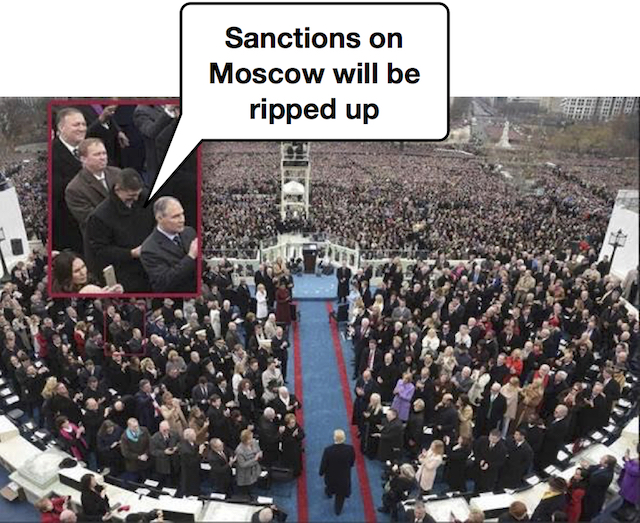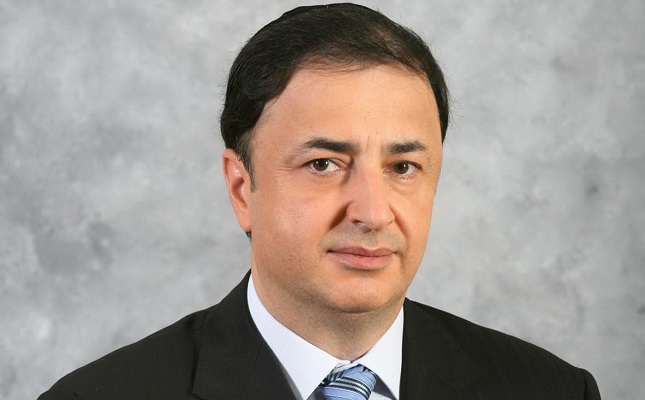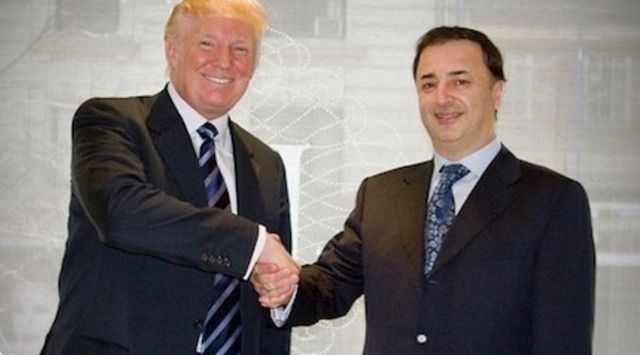l
Kushner dealings with Deutsche Bank may draw scrutiny from special counsel White House senior adviser Jared Kushner in the East Room of the White House in Washington. (Photo by Jabin Botsford/The Washington Post)
By Michael Kranish June 25 at 9:04 PM
One month before Election Day, Jared Kushner’s real estate company finalized a $285 million loan as part of a refinancing package for its property near Times Square in Manhattan.
The loan came at a critical moment. Kushner was playing a key role in the presidential campaign of his father-in-law, Donald Trump. The lender, Deutsche Bank, was negotiating to settle a federal mortgage fraud case and charges from New York state regulators that it aided a possible Russian money-laundering scheme. The cases were settled in December and January.
Now, Kushner’s association with Deutsche Bank is among a number of financial matters that could come under focus as his business activities are reviewed by special counsel Robert S. Mueller III, who is examining Kushner as part of a broader investigation into possible Russian influence in the election.
The October deal illustrates the extent to which Kushner was balancing roles as a top adviser to Trump and a real estate company executive. After the election, Kushner juggled duties for the Trump transition team and his corporation as he prepared to move to the White House. The Washington Post has reported that investigators are probing Kushner’s separate December meetings with the Russian ambassador to the United States, Sergey Kislyak, and with Russian banker Sergey Gorkov, the head of Vnesheconombank, a state development bank.
The Deutsche Bank loan capped what Kushner Cos. viewed as a triumph: It had purchased four mostly empty retail floors of the former New York Times building in 2015, recruited tenants to fill the space and got the Deutsche Bank loan in a refinancing deal that gave Kushner’s company $74 million more than it paid for the property.
The White House, in response to questions from The Post, said in a statement that Kushner “will recuse from any particular matter involving specific parties in which Deutsche Bank is a party.” Kushner and Deutsche Bank declined to comment.
Deutsche Bank loans to Trump and his family members have come under scrutiny. As Trump’s biggest lender, the bank supplied funds to him when other banks balked at the risk. As of last year, Trump’s companies had about $364 million in outstanding debts to the bank.
Democrats from the House Financial Services Committee wrote on March 10 that they were concerned about the “integrity” of a reported Justice Department investigation into the Russian money-laundering matter “given the President’s ongoing conflicts of interest with Deutsche Bank,” citing “the suspicious ties between President Trump’s inner circle and the Russian government.” The Justice Department did not respond to a question about whether it is following up on the money-laundering settlement that Deutsche Bank reached with New York state regulators in December.
On May 23, the Democratic members asked Deutsche Bank to disclose what it had learned in its internal review about whether Trump may have benefited from the improper Russian money transfers. The bank refused, citing U.S. privacy laws. The Democratic letter also raised the possibility that the bank had conducted a similar review of Kushner — without mentioning his name — by referring to a review of accounts “held by family members, several of whom serve as official advisers to the president.”
The Democrats wrote that it was important to learn more about Deutsche Bank loans to Trump and family members to determine whether they were “in any way connected to Russia.”
The refinancing loan with Deutsche Bank is mentioned in documents filed with the Securities and Exchange Commission as part of a public offering of mortgage-backed securities. It states that Kushner and his brother, Joshua, “will be guarantors” under what was called a “nonrecourse carve-out.” Such guarantees require more than a loan default to kick in. They are commonly known as “bad boy” clauses, a reference to how a lender could seek to hold the guarantor responsible for the debt under circumstances that might include fraud, misapplication of funds or voluntary bankruptcy deemed inappropriate. The terms of the guarantee, which generally are not secured by collateral, are negotiated between lender and borrower.
“The way to look at this is, so long as you’re not a ‘bad boy’ and don’t do anything wrong, you have nothing to worry about,” said James Schwarz, a real estate lawyer who is an expert in such clauses. “To the extent you would do something fraudulent, then you have things to worry about.”
The corporate loan and Kushner’s personal guarantee are not mentioned on his financial disclosure form, filed with the Office of Government Ethics. Blake Roberts, a lawyer who represented Kushner on the matter, said in a statement to The Post that Kushner’s form “does not list the loan guarantee” because the disclosure relied on “published guidance” from OGE that he said “clearly states that filers do not have to disclose as a liability a loan on which they have made a guarantee unless they have a present obligation to repay the loan.”
The Post sent the language cited by Kushner’s lawyer to Don Fox, a former general counsel and acting OGE director. After reviewing the wording, he said in an interview that he would have advised Kushner to disclose the personal guarantee of the $285 million corporate loan because of its size and possible implications.
“If I were still at OGE and somebody came to us with that set of facts, I would say, ‘By all means, disclose it,’ ” he said, referring to “the spirit of the law.”
After being informed of Fox’s statement, Roberts contacted Fox to present his view that no disclosure was required. Fox said in a follow-up email to The Post that even if OGE “advised there was no requirement to disclose,” he would not have argued that point but “I would have nonetheless recommended Jared over report in this instance given the magnitude of the contingency and the public interest in liabilities — actual and potential — to Deutsche Bank.”
Separately, Kushner disclosed that he and his mother have a personal line of credit with Deutsche Bank worth up to $25 million.
The Deutsche Bank deal was one of the last Kushner orchestrated before joining the White House. It is among the dozens of complex transactions that he was involved with during his decade in the real estate business.
Although Kushner divested some properties in an effort to address potential conflicts, he retains an interest in nearly 90 percent of his real estate properties, including the retail portion of the former New York Times headquarters, and holds personal debts and loan guarantees.
The deal that led to the Deutsche Bank loan is rooted in a holiday party held in late 2014 at the Bowlmor bowling alley, which is located in the retail portion.
At the party, Kushner decided that the four retail floors of the building, while rundown, could be transformed into a thriving tourist destination, according to his associates.
The building passed through several owners after the newspaper sold the property for $175 million in 2004 to Tishman Speyer. Tishman sold it three years later for $525 million to a company called Africa-Israel Investments. (Those transactions prompted Trump a few months ago to poke fun at the Times, tweeting that the “dopes” at the newspaper “gave it away.”)
Africa-Israel’s decision to purchase the building was made by its chairman, an Uzbek-born Israeli citizen, Lev Leviev. He is one of the world’s wealthiest men, known as the “King of Diamonds” for his extensive holdings in Africa, Israel and Russia. He was then expanding his real estate holdings in New York City.
Leviev told the New York Times shortly after the building’s purchase that he was a “true friend” of Russian President Vladimir Putin, largely through his work with an influential Jewish organization in the former Soviet Union. The newspaper wrote that he kept a photo of Putin in his office in Israel. Leviev’s company said in a statement to The Post that Leviev “does not have a personal relationship” with Putin but has met him “on a few occasions.” Leviev’s statement said he was referring to his belief that “Mr. Putin has been a ‘true friend’ to the Jewish people in Russia.”
In 2008, a year after the building’s purchase, Leviev invited Trump to his Madison Avenue store, an ultra-high-end establishment called Leviev Jewelry, where they were photographed together, according to the Leviev statement. Leviev hoped to work with Trump on Moscow real estate deals, according to an article in Kommersant, a Russian newspaper. The Leviev statement said that the two “never had any business dealings with one another, contrary to speculation.”
Six years later, Kushner saw an opportunity for his own company.
Leviev, whose company was having financial difficulties, according to an Israeli press account, sold the building’s 12-floor office portion for $160 million, a transaction that did not involve the four retail floors.
Leviev’s daughter, Chagit, took charge of her father’s U.S. subsidiary and set out to find a buyer for the retail portion of the building. The company said it would entertain offers no lower than $300 million.
Kushner’s company offered $265 million, which was rejected. Kushner himself then negotiated with Chagit Leviev and others in 2015 and succeeded with a $296 million offer, according to an official involved in the matter.
“It was a very hard back-and-forth New York negotiating style,” said Kushner’s broker, Lon Rubackin. Leviev’s partner in the deal, Five Mile Capital, did not respond to a request for comment.
Few knew it at the time, but the negotiations were nearly consummated when Kushner and his wife, Ivanka Trump, ran into Chagit Leviev on May 4, 2015, at an after-party for a Metropolitan Museum of Art gala — an encounter that was memorialized in a picture posted on Instagram.
“Such a pleasure seeing @jaredckushner and his stunningly beautiful wife @ivankatrump last night [at] the #metballafterparty,” Chagit Leviev wrote.
The deal was signed a week later and closed in October 2015. The Leviev company said in a statement to The Post that Kushner simply made the highest offer and “there was no political element to the transaction.”
Kushner took over a property that was only 25 percent leased, according to a company official. His company recruited tenants, offering some a year’s free rent to lock in long-term contracts, according to an SEC filing. As a result, the building was nearly fully leased, with higher rents, including new tenants such as National Geographic.
The strategy paid off when Kushner’s company went to Deutsche Bank for refinancing. An appraisal cited in SEC filings for the package of mortgage-backed securities placed the value at $470 million, a 59 percent increase in a year. The bank declined to release the appraisal, but a person involved in the deal said that such a rapid increase was unusual when New York real estate was rebounding from recession, and credited Kushner for finding stellar tenants.
In a statement, Kushner Cos. President Laurent Morali said the property’s value increased sharply “for a simple reason: the building’s dramatic turnaround. We had a vision for the property when we purchased it that no one else had, and are proud to say that we executed on it.”
Kushner’s company took out $370 million in new loans in October 2016, giving it $74 million more than the purchase price a year earlier. Along with $285 million from Deutsche Bank, Kushner’s firm received $85 million from SL Green Realty, where Kushner had once worked as an intern. SL Green spokesman Rick Matthews said the deal made sense because the building has been mostly leased, giving it “increased value.”
The Deutsche Bank loan was delivered just before the bank — which has long been under investigation by federal and state authorities — agreed to pay a $7.2 billion U.S. penalty in December for mortgage securities fraud in its packaging of residential mortgages. The bank also paid a $425 million New York state fine in January for failing to properly track large transfers from Russia.
Democrats on the House Financial Services Committee wrote in their March 10 letter that because “press reports indicate” the Justice Department is continuing to investigate the money- laundering case, they are “concerned about the integrity of this criminal probe” in light of Trump’s “ongoing conflicts of interest with Deutsche Bank.” Bloomberg News has reported that the Justice Department has requested records related to money laundering from Deutsche Bank as part of a probe.
https://www.washingtonpost.com/national ... a96038ffcf



